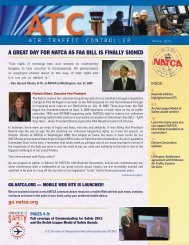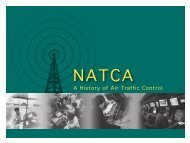Against the Wind - National Air Traffic Controllers Association
Against the Wind - National Air Traffic Controllers Association
Against the Wind - National Air Traffic Controllers Association
You also want an ePaper? Increase the reach of your titles
YUMPU automatically turns print PDFs into web optimized ePapers that Google loves.
thority concerning day-to-day conditions of employment.”<br />
Reuben also agreed with AATCC’s inclusion of<br />
automation specialists and air traffic assistants in <strong>the</strong><br />
union since employees in both jobs worked closely<br />
with controllers. <strong>Traffic</strong> assistants even reported<br />
to <strong>the</strong> same supervisors and personnel office.<br />
The FAA had sixty days to appeal, until<br />
which time <strong>the</strong> election for a union in<br />
New England remained on hold. Never<strong>the</strong>less,<br />
<strong>the</strong> ruling thrilled AATCC’s organizers.<br />
They were also encouraged that <strong>the</strong><br />
FLRA’s regional director understood <strong>the</strong><br />
FAA’s inconsistent management policies.<br />
All controllers knew that <strong>the</strong> FAA was not<br />
<strong>the</strong> cohesive, nationwide entity it purported<br />
to be. Substantial differences in work rules,<br />
terminology, and even some operating procedures<br />
existed among <strong>the</strong> regions, giving rise to <strong>the</strong> term<br />
“<strong>the</strong> Nine Kingdoms.”<br />
Shortly after <strong>the</strong> ruling, Eastern Region ga<strong>the</strong>red<br />
enough signatures to petition <strong>the</strong> FLRA for a<br />
second regional unit. By <strong>the</strong> spring of 1985, AATCC<br />
had submitted sixty-four petitions—more than double<br />
<strong>the</strong> number from <strong>the</strong> previous October—from<br />
facilities in twenty states and Puerto Rico, thanks<br />
to dogged efforts by Thornton, two organizers he’d<br />
hired, and numerous controllers. Discontent was<br />
so pervasive at <strong>the</strong> San Juan CERAP that Barte and<br />
Gropper signed up most of <strong>the</strong> controllers during a<br />
30<br />
Nov.<br />
The United States <strong>Air</strong> <strong>Traffic</strong> Control Organization disbands due to a lack<br />
of money. USATCO was created in April 1982 and included about 800<br />
members at its peak in 1983. Existing without a contract or an employer,<br />
three-day trip to Puerto Rico.<br />
AFGE’s Eastern states organizer was Beth Thomas.<br />
A former operating room nurse turned controller,<br />
Thomas had firsthand experience<br />
with <strong>the</strong> issues and was steeped in<br />
union culture. She had grown<br />
up in Altoona, Pennsylvania,<br />
where her grandfa<strong>the</strong>r<br />
sloshed through knee-deep,<br />
icy water in <strong>the</strong> state’s coal<br />
mines. His descriptions<br />
of <strong>the</strong> hazardous working<br />
conditions—miners carried<br />
a canary with <strong>the</strong>m through<br />
<strong>the</strong> dark, dank tunnels to<br />
warn of toxic gases—left a lasting<br />
impression about <strong>the</strong> important<br />
protections that unions can provide.<br />
Thomas’s mo<strong>the</strong>r worked for <strong>the</strong> city and belonged<br />
to a union, as did several uncles who held railroad<br />
jobs.<br />
Her husband, Chuck, was a fired controller<br />
in Tampa. Beth Thomas had applied to <strong>the</strong> agency<br />
in <strong>the</strong> 1970s and was waiting to be hired when <strong>the</strong><br />
strike hit. The FAA offered her a job soon after, but<br />
she declined. However, she accepted a second offer<br />
in December 1981 and was assigned to small control<br />
towers in Hagerstown, Maryland, and Binghamton,<br />
New York. Unable to transfer back to Tampa, where<br />
Chapter 3: A Long and <strong>Wind</strong>ing Road<br />
USATCO focused on reinstating <strong>the</strong> fired controllers. Membership continually<br />
dwindled, however, in <strong>the</strong> face of a May 1984 federal court ruling<br />
against reinstatement and President Reagan’s re-election in <strong>the</strong> fall.<br />
59<br />
Beth Thomas: The controller turned labor<br />
organizer understood <strong>the</strong> pressures of<br />
her former profession. Even so, Thomas<br />
fought an uphill battle persuading controllers<br />
to support a new union. / NATCA archives




